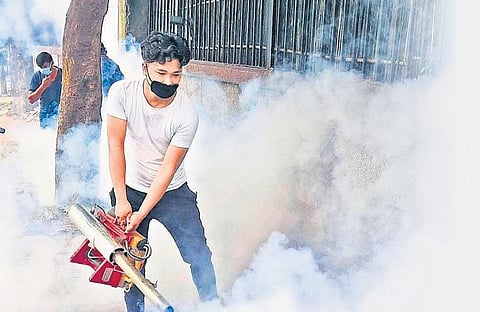

KOCHI: Kerala has been witnessing a sharp spike in communicable diseases like dengue and leptospirosis, putting its health system under severe strain. In the first four days of November alone, there have been 224 dengue cases, and two deaths. The state has also reported 40 cases of leptospirosis and two related deaths in November, according to the directorate of health services. So far in 2023, the state has reported 45 dengue deaths and 74 leptospirosis deaths, whereas the corresponding number for 2022 was 29 and 93, respectively.
Dengue is a viral disease spread by the Aedes mosquito while leptospirosis is a bacterial disease which enters the body through tiny wounds. While heavy rain and the resultant waterlogging is a cause for the increase in leptospirosis cases, stagnant water creates an atmosphere for mosquito-breeding, triggering dengue outbreaks.
Dr Rajeev Jaydevan, a member of the public health advisory panel under the IMA’s state unit, said that the leptospirosis-causing bacteria is present in the urine of several animals, not just rats. “Because of its colloquial name, rat fever, some people think that as long as there are no rats in the area, they won’t get it.
The disease can spread through the urine of most animals around us -- cattle, stray dogs, cats and rats. These bacteria are common and remain alive in wet soil. When it rains, they spread to other areas as well. As animals are part of our environment, we can’t blame it on poor preparation alone for the spread,” he said. Dr Abraham Varghese, a former state president of IMA, said keeping the surroundings clean can stop the spread of the diseases to an extent.
“The stagnant water in drains and canals is a threat. They should be cleaned to stop the breeding of mosquitoes and to prevent waterlogging,” he said. Dr Rajeev also touched on the problems arising out of garbage accumulation.
“Improper disposal of garbage promote stray dog and rat population. Also, mosquitoes can breed even in a tiny puddle of water within 10 to 12 days. When water in the drains doesn’t flow, it creates problems. Thus, a lack of preparation to some extent can cause the spread,” he said.
Early detection and treatment is key to reducing the number of deaths. “When people get a fever, they take paracetamol or dolo to suppress it. They will consult a doctor only if the symptoms continue. By then, it will enter the blood and we may not be able to treat it,” added Dr Abraham.
Dr Rajeev too stressed that starting treatment at the earliest is important. “The antibiotic used to treat leptospirosis is available at health centres. People with symptoms should consult a doctor,” he said, urging the public not to consume antibiotics for all types of fevers. As tests turn positive only a week after the onset of the illness, that should not become a reason for a delay in starting medication.